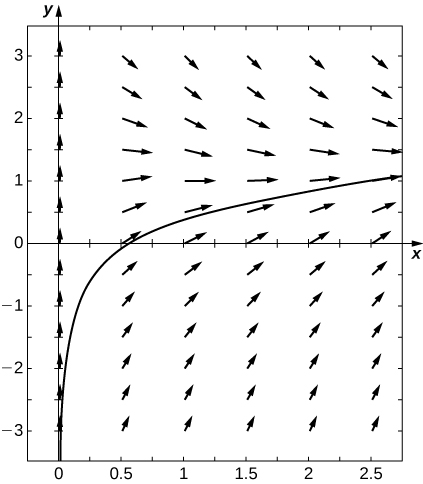8.R: Chapter 8 Review Exercises
- Page ID
- 71712
\( \newcommand{\vecs}[1]{\overset { \scriptstyle \rightharpoonup} {\mathbf{#1}} } \)
\( \newcommand{\vecd}[1]{\overset{-\!-\!\rightharpoonup}{\vphantom{a}\smash {#1}}} \)
\( \newcommand{\dsum}{\displaystyle\sum\limits} \)
\( \newcommand{\dint}{\displaystyle\int\limits} \)
\( \newcommand{\dlim}{\displaystyle\lim\limits} \)
\( \newcommand{\id}{\mathrm{id}}\) \( \newcommand{\Span}{\mathrm{span}}\)
( \newcommand{\kernel}{\mathrm{null}\,}\) \( \newcommand{\range}{\mathrm{range}\,}\)
\( \newcommand{\RealPart}{\mathrm{Re}}\) \( \newcommand{\ImaginaryPart}{\mathrm{Im}}\)
\( \newcommand{\Argument}{\mathrm{Arg}}\) \( \newcommand{\norm}[1]{\| #1 \|}\)
\( \newcommand{\inner}[2]{\langle #1, #2 \rangle}\)
\( \newcommand{\Span}{\mathrm{span}}\)
\( \newcommand{\id}{\mathrm{id}}\)
\( \newcommand{\Span}{\mathrm{span}}\)
\( \newcommand{\kernel}{\mathrm{null}\,}\)
\( \newcommand{\range}{\mathrm{range}\,}\)
\( \newcommand{\RealPart}{\mathrm{Re}}\)
\( \newcommand{\ImaginaryPart}{\mathrm{Im}}\)
\( \newcommand{\Argument}{\mathrm{Arg}}\)
\( \newcommand{\norm}[1]{\| #1 \|}\)
\( \newcommand{\inner}[2]{\langle #1, #2 \rangle}\)
\( \newcommand{\Span}{\mathrm{span}}\) \( \newcommand{\AA}{\unicode[.8,0]{x212B}}\)
\( \newcommand{\vectorA}[1]{\vec{#1}} % arrow\)
\( \newcommand{\vectorAt}[1]{\vec{\text{#1}}} % arrow\)
\( \newcommand{\vectorB}[1]{\overset { \scriptstyle \rightharpoonup} {\mathbf{#1}} } \)
\( \newcommand{\vectorC}[1]{\textbf{#1}} \)
\( \newcommand{\vectorD}[1]{\overrightarrow{#1}} \)
\( \newcommand{\vectorDt}[1]{\overrightarrow{\text{#1}}} \)
\( \newcommand{\vectE}[1]{\overset{-\!-\!\rightharpoonup}{\vphantom{a}\smash{\mathbf {#1}}}} \)
\( \newcommand{\vecs}[1]{\overset { \scriptstyle \rightharpoonup} {\mathbf{#1}} } \)
\(\newcommand{\longvect}{\overrightarrow}\)
\( \newcommand{\vecd}[1]{\overset{-\!-\!\rightharpoonup}{\vphantom{a}\smash {#1}}} \)
\(\newcommand{\avec}{\mathbf a}\) \(\newcommand{\bvec}{\mathbf b}\) \(\newcommand{\cvec}{\mathbf c}\) \(\newcommand{\dvec}{\mathbf d}\) \(\newcommand{\dtil}{\widetilde{\mathbf d}}\) \(\newcommand{\evec}{\mathbf e}\) \(\newcommand{\fvec}{\mathbf f}\) \(\newcommand{\nvec}{\mathbf n}\) \(\newcommand{\pvec}{\mathbf p}\) \(\newcommand{\qvec}{\mathbf q}\) \(\newcommand{\svec}{\mathbf s}\) \(\newcommand{\tvec}{\mathbf t}\) \(\newcommand{\uvec}{\mathbf u}\) \(\newcommand{\vvec}{\mathbf v}\) \(\newcommand{\wvec}{\mathbf w}\) \(\newcommand{\xvec}{\mathbf x}\) \(\newcommand{\yvec}{\mathbf y}\) \(\newcommand{\zvec}{\mathbf z}\) \(\newcommand{\rvec}{\mathbf r}\) \(\newcommand{\mvec}{\mathbf m}\) \(\newcommand{\zerovec}{\mathbf 0}\) \(\newcommand{\onevec}{\mathbf 1}\) \(\newcommand{\real}{\mathbb R}\) \(\newcommand{\twovec}[2]{\left[\begin{array}{r}#1 \\ #2 \end{array}\right]}\) \(\newcommand{\ctwovec}[2]{\left[\begin{array}{c}#1 \\ #2 \end{array}\right]}\) \(\newcommand{\threevec}[3]{\left[\begin{array}{r}#1 \\ #2 \\ #3 \end{array}\right]}\) \(\newcommand{\cthreevec}[3]{\left[\begin{array}{c}#1 \\ #2 \\ #3 \end{array}\right]}\) \(\newcommand{\fourvec}[4]{\left[\begin{array}{r}#1 \\ #2 \\ #3 \\ #4 \end{array}\right]}\) \(\newcommand{\cfourvec}[4]{\left[\begin{array}{c}#1 \\ #2 \\ #3 \\ #4 \end{array}\right]}\) \(\newcommand{\fivevec}[5]{\left[\begin{array}{r}#1 \\ #2 \\ #3 \\ #4 \\ #5 \\ \end{array}\right]}\) \(\newcommand{\cfivevec}[5]{\left[\begin{array}{c}#1 \\ #2 \\ #3 \\ #4 \\ #5 \\ \end{array}\right]}\) \(\newcommand{\mattwo}[4]{\left[\begin{array}{rr}#1 \amp #2 \\ #3 \amp #4 \\ \end{array}\right]}\) \(\newcommand{\laspan}[1]{\text{Span}\{#1\}}\) \(\newcommand{\bcal}{\cal B}\) \(\newcommand{\ccal}{\cal C}\) \(\newcommand{\scal}{\cal S}\) \(\newcommand{\wcal}{\cal W}\) \(\newcommand{\ecal}{\cal E}\) \(\newcommand{\coords}[2]{\left\{#1\right\}_{#2}}\) \(\newcommand{\gray}[1]{\color{gray}{#1}}\) \(\newcommand{\lgray}[1]{\color{lightgray}{#1}}\) \(\newcommand{\rank}{\operatorname{rank}}\) \(\newcommand{\row}{\text{Row}}\) \(\newcommand{\col}{\text{Col}}\) \(\renewcommand{\row}{\text{Row}}\) \(\newcommand{\nul}{\text{Nul}}\) \(\newcommand{\var}{\text{Var}}\) \(\newcommand{\corr}{\text{corr}}\) \(\newcommand{\len}[1]{\left|#1\right|}\) \(\newcommand{\bbar}{\overline{\bvec}}\) \(\newcommand{\bhat}{\widehat{\bvec}}\) \(\newcommand{\bperp}{\bvec^\perp}\) \(\newcommand{\xhat}{\widehat{\xvec}}\) \(\newcommand{\vhat}{\widehat{\vvec}}\) \(\newcommand{\uhat}{\widehat{\uvec}}\) \(\newcommand{\what}{\widehat{\wvec}}\) \(\newcommand{\Sighat}{\widehat{\Sigma}}\) \(\newcommand{\lt}{<}\) \(\newcommand{\gt}{>}\) \(\newcommand{\amp}{&}\) \(\definecolor{fillinmathshade}{gray}{0.9}\)True or False? Justify your answer with a proof or a counterexample.
1) The differential equation \(y'=3x^2y−\cos(x)y''\) is linear.
2) The differential equation \(y'=x−y\) is separable.
- Answer
- \(F\)
3) You can explicitly solve all first-order differential equations by separation or by the method of integrating factors.
4) You can determine the behavior of all first-order differential equations using directional fields or Euler’s method.
- Answer
- \(T\)
For the following problems, find the general solution to the differential equations.
5) \(y′=x^2+3e^x−2x\)
6) \(y'=2^x+\cos^{−1}x\)
- Answer
- \(y(x)=\frac{2^x}{ln(2)}+xcos^{−1}x−\sqrt{1−x^2}+C\)
7) \(y'=y(x^2+1)\)
8) \(y'=e^{−y}\sin x\)
- Answer
- \(y(x)=\ln(C−\cos x)\)
9) \(y'=3x−2y\)
10) \(y'=y\ln y\)
- Answer
- \(y(x)=e^{e^{C+x}}\)
For the following problems, find the solution to the initial value problem.
11) \(y'=8x−\ln x−3x^4, \quad y(1)=5\)
12) \(y'=3x−\cos x+2, \quad y(0)=4\)
- Answer
- \(y(x)=4+\frac{3}{2}x^2+2x−\sin x\)
13) \(xy'=y(x−2), \quad y(1)=3\)
14) \(y'=3y^2(x+\cos x), \quad y(0)=−2\)
- Answer
- \(y(x)=−\dfrac{2}{1+3(x^2+2\sin x)}\)
15) \((x−1)y'=y−2, \quad y(0)=0\)
16) \(y'=3y−x+6x^2, \quad y(0)=−1\)
- Answer
- \(y(x)=−2x^2−2x−\frac{1}{3}−\frac{2}{3}e^{3x}\)
For the following problems, draw the directional field associated with the differential equation, then solve the differential equation. Draw a sample solution on the directional field.
17) \(y'=2y−y^2\)
18) \(y'=\dfrac{1}{x}+\ln x−y,\) for \(x>0\)
- Answer
-
\(y(x)=Ce^{−x}+\ln x\)

For the following problems, use Euler’s Method with \(n=5\) steps over the interval \(t=[0,1]\). Then solve the initial-value problem exactly. How close is your Euler’s Method estimate?
19) \(y'=−4yx, \quad y(0)=1\)
20) \(y'=3^x−2y, \quad y(0)=0\)
- Answer
- Euler: \(0.6939\),
Exact solution: \(y(x)=\dfrac{3^x−e^{−2x}}{2+\ln(3)}\)
For the following problems, set up and solve the differential equations.
21) A car drives along a freeway, accelerating according to \(a=5\sin(πt),\) where \(t\) represents time in minutes. Find the velocity at any time \(t\), assuming the car starts with an initial speed of \(60\) mph.
22) You throw a ball of mass \(2\) kilograms into the air with an upward velocity of \(8\) m/s. Find exactly the time the ball will remain in the air, assuming that gravity is given by \(g=9.8\,\text{m/s}^2\).
- Answer
- \(\frac{40}{49}\) second
23) You drop a ball with a mass of \(5\) kilograms out an airplane window at a height of \(5000\) m. How long does it take for the ball to reach the ground?
24) You drop the same ball of mass \(5\) kilograms out of the same airplane window at the same height, except this time you assume a drag force proportional to the ball’s velocity, using a proportionality constant of \(3\) and the ball reaches terminal velocity. Solve for the distance fallen as a function of time. How long does it take the ball to reach the ground?
- Answer
- \(x(t)=5000+\frac{245}{9}−\frac{49}{3}t−\frac{245}{9}e^{−5/3t}, \quad t=307.8\) seconds
25) A drug is administered to a patient every \(24\) hours and is cleared at a rate proportional to the amount of drug left in the body, with proportionality constant \(0.2\). If the patient needs a baseline level of \(5\) mg to be in the bloodstream at all times, how large should the dose be?
26) A \(1000\)-liter tank contains pure water and a solution of \(0.2\) kg salt/L is pumped into the tank at a rate of \(1\) L/min and is drained at the same rate. Solve for total amount of salt in the tank at time \(t\).
- Answer
- \(T(t)=200\left(1−e^{−t/1000}\right)\)
27) You boil water to make tea. When you pour the water into your teapot, the temperature is \(100°C.\) After \(5\) minutes in your \(15°C\) room, the temperature of the tea is \(85°C\). Solve the equation to determine the temperatures of the tea at time \(t\). How long must you wait until the tea is at a drinkable temperature (\(72°C\))?
28) The human population (in thousands) of Nevada in \(1950\) was roughly \(160\). If the carrying capacity is estimated at \(10\) million individuals, and assuming a growth rate of \(2\%\) per year, develop a logistic growth model and solve for the population in Nevada at any time (use \(1950\) as time = 0). What population does your model predict for \(2000\)? How close is your prediction to the true value of \(1,998,257\)?
- Answer
- \(P(t)=\dfrac{1600000e^{0.02t}}{9840+160e^{0.02t}}\)
29) Repeat the previous problem but use Gompertz growth model. Which is more accurate?


